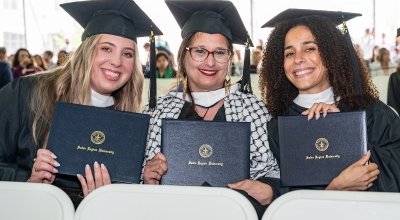
Salve awarded 235 advanced degrees during graduate Commencement

Salve Regina University celebrated its graduate Commencement, conferring 206 master’s degrees, 18 doctoral degrees and 11 Doctor of Nursing Practice degrees upon the Class of 2025 on May 15. The ceremony honored not only academic achievement, but a profound commitment to service, leadership and ethical scholarship.
Among this year’s graduates was Jeremy Spector, who was chosen to deliver the keynote address – a speech that echoed the values at the heart of Salve’s mission and resonated with the graduating class.
Spector, a former Naval officer and U.S. diplomat, earned his doctorate with a dissertation titled “Anti-feminism as a Forecasting Barometer for Political Radicalization: The Case of Bosnia and Herzegovina.” In his remarks, he reflected on his decision to return to the classroom after a long career in public service – a choice rooted in a desire to better understand the world and to lead with greater purpose.
“Like many of you, I was asking deeper questions – not just about policy and strategy, but about impact, and about how to serve more thoughtfully in a rapidly changing world,” Spector shared from the podium. “That shared search brought us to Salve Regina.”
With only 14% of adults in the U.S. holding a master’s degree, the graduates join a distinguished group of scholars who have pursued advanced education to make a meaningful difference in their fields and communities.
Salve’s wide range of graduate programs span areas such as administration of justice and homeland security, holistic counseling, business, healthcare leadership, creative writing and more. The programs are built to prepare students for career advancement and to shape compassionate leaders grounded in ethics, justice and service.
The master’s graduates of 2025 leave Salve equipped with specialized knowledge and a powerful sense of purpose, ready to lead in an increasingly complex world.
29 doctoral degrees reflect a range of fields, common focus on values
The University conferred 29 doctoral degrees across three distinct programs: the Ph.D. in humanities, the Doctor of Nursing Practice (DNP) and the Ph.D. in international relations.
The Ph.D. in humanities challenges students to explore the human experience through interdisciplinary lenses, encouraging deep ethical reflection and civic engagement. The DNP equips nursing professionals to lead at the highest levels of practice, improving patient outcomes and healthcare systems with compassion and innovation. The Ph.D. in international relations prepares professionals to examine global affairs through rigorous study and immersive, culture-driven research in the field.
What ties these programs together is their shared foundation in value-based leadership. For Spector and his fellow graduates, that foundation created a unique academic community – one that thrived across time zones and professions, even in virtual spaces.
“From every corner of the country and around the globe, our classmates brought energy, perspective and purpose to every discussion,” Spector said. “That diversity of thought and the respect we showed one another, reminded us just how much we still gain from listening and communicating, even when we disagree.”
His reflections underscored one of the core messages of the day: that education at its best prepares individuals not just for success, but for service.
“In a world that often feels divided, this program has been a powerful reminder that thoughtful conversation and genuine curiosity can bridge differences,” he said. “I hope we leave here not just with new knowledge, but with a renewed dedication to lead with integrity, to engage with curiosity and to serve something greater than ourselves.”
The doctoral recipients and their dissertation titles were:
Humanities
- Jonathan Wallace Alexander: “Lethal Autonomous Weapon Systems and the Potential of Moral Injury”
- Victoria Ashley Cuartas: “The Sociological Phenomena of the Female Performance: Exploring Femininity in the Photographs of Diane Arbus”
- Eric L. Epps: “Beyond Bias: The Ethics of Risk-Based Artificial Intelligence Decision-Making in the Criminal Justice System”
- Loretta Di Bianca Fois: “Thirdness as a Tool for Socio-Ethical Transformation in Group Improvisational Play”
- Hunter Thomas Foote: “Scaling Social Enterprise: How Social Franchising Supports Sustainable Growth and Impact.”
- Sharon A. Shabo-Franco: “From the Abbey to the Digital Age: How Extraordinary Women Have Used Music to Take Power When None Was Given”
- Kathleen Marie Jaczynski: “God’s Laughing Too: Sacralization through Stand-up Comedy”
- Donald R. Marks: “The Restoration of Psyche: Heidegger, Ellul, and the Question of Technology in Clinical Psychological Science”
- Darren F. McClurg: “Visions of Catastrophe: Human Enhancement in Contemporary, Dystopian Speculative Fiction”
- Katherine A. Titus: “The Voices of Job as Understood Through Internal Family Systems Theory (IFS)”
- Christtian Travieso: “A Blueprint for an Engaging Zoom Classroom: Shortening the Distance in Distance Learning Through Media Ecology and Phenomenology”
- Lisa Mary Wichowski: “Suffering and Solace: Photography and Trauma in a Changing Nation”
International relations
- Nicole S. Klingensmith: “Using Nuclear Forces to Reconcile Status Deficits in China and Russia: Status and Identity Perception as Motivating Drivers of Change”
- Francis Eliya Lomami: “The Moral and Rational Inquiry of Africa’s Armed Conflicts: Wars and Peace in the Democratic Republic of Congo”
- Aaron Hurley Pratt: “Institutionalizing the Rule of Law in Central America: Domestic Politics Versus Foreign Influences”
- Jeremy David Spector: “Anti-feminism as a Forecasting Barometer for Political Radicalization: The Case of Bosnia and Herzegovina”
- Carol Lamastra Weil: “Chief Talking Points: A Case Study of the Fourteen Chiefs of Mission of the United States Interests Section in Havana, Cuba from September 1, 1977 to July 20, 2015”
- Matthew Zalewski: “The Failure of Poland’s Intermarium Policy in the Interwar Period”
Doctor of Nursing Practice
- Sanh Angkhavong: “Wellness Initiative for Employees Working in Long-Term Care”
- Meridith Louise Arden: “Implementation of a Social Health Assessment and Support in a Mental Health Outpatient Practice: A Quality Improvement Project”
- Natasha C. Beasley: “Wellness Initiative for Employees Working in Long-Term Care”
- Michelle Blade Mello: “Increasing Identification of High Fall Risk in Community-Dwelling Seniors 65 and Older Through Primary Care Screening using the STEADI Fall Risk Screening Tool”
- Shonda Escobar: “The Heart of Advanced Heart Failure Caregivers: Impact of Social Support on Subjective Burden”
- Rodilyn Glushchenko: “Medical Device Related Pressure Injuries Associated with Endotracheal Tube Securement Practices: A Retrospective Study”
- Nickesha Mckenzie: “Implementation of a Depression Screening Protocol Using the PHQ-9 Instrument to Screen for Depression and Initiate Billing for a Brief Behavioral Assessment in an Outpatient Behavioral Health Office in Southern New England”
- Elizabeth Jane Nelson-Frazier: “Polypharmacy and Frailty Scores in Geriatric Patients”
- Kayla Silva: “Sepsis Alert Implementation to Improve the Door to Antibiotics Time in Adult Patients in the Emergency Setting”
- Mary Kay Wegman: “Implementation of an Electronic Medical Record Clinical Reminder for Pre-Exposure Prophylaxis (PrEP) Treatment for Human Immunodeficiency Virus (HIV)”
- Marie Woolery: “Wellness Initiative for Employees Working in Long-Term Care”
